by Gary Lord
Home - Genesis - 2007 - 2008 - 2009 - Early 2010 - Mid 2010 - Late 2010 - End 2010 - Early 2011 - Mid 2011 - Late 2011 - End 2011 - Early 2012 - Late 2012 - Early 2013- Late 2013 - 2014 - 2015 - Early 2016 - Late 2016 - 2017-19
Chapter Twenty One: 2017-19
*
Seth Rich Redux
On the day after the 2016 US election, Ellen Ratner, the sister of deceased WikiLeaks lawyer Michael Ratner, appeared on US television and revealed that she had spent three hours talking with Julian Assange just a few days earlier.
"He said the leaks were not from the Russians. They were from an internal source from the Hillary campaign or from somone who knew Hillary, an enemy. He does not think they’re from Russians. Russia got credit for something WikiLeaks should have got credit for."
Ratner was more or less reiterating what Craig Murray had previously stated. At any rate, on 17 December 2016, a Dallas businessman named Ed Butowsky contacted the family of Seth Rich and told them that he had a message for them from Julian Assange. He said he had received the message via a mutual friend, Ellen Ratner, who denied ever giving him such a message. The message, Butowsky said, was that Seth Rich had been a WikiLeaks source for the DNC leaks.
This visit triggered a series of events that lead to years of complex legal battles. According to Butowsky’s lawsuit, Seth Rich’s father Joel initially said that he already knew both his sons, Seth and Aaron, were involved in the leaks:
During that conversation, Mr. Rich told Mr. Butowsky that he already knew that his sons were involved in the DNC email leak, but he and his wife just wanted to know who murdered Seth. Mr. Rich said he was reluctant to go public with Seth’s and Aaron’s role in leaking the emails because “we don’t want anyone to think our sons were responsible for getting Trump elected."
Butowsky offered to provide the Rich family with a private detective to help them find out who killed their son. The Rich family had previously received pro bono public relations assistance from a right-wing fraudster named Jack Burkman, but distanced themselves from him after he claimed that Seth had been killed by Russians who were covering up evidence of their DNC hacking. Butowsky hired Rod Wheeler, a former homicide detective with the Metropolitan Police Department in Washington DC, who were nominally in charge of the murder investigation. Both Butowsky and Wheeler had links to FOX News.
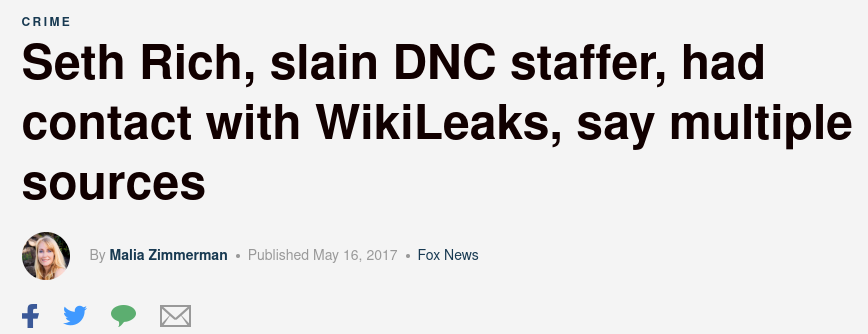
On 16 May 2017 FOX News published an explosive story about an anonymous US federal investigator who claimed to have reviewed an FBI forensic report detailing the contents of Seth Rich’s computer, including emails between Seth Rich and WikiLeaks. It quoted ex-detective Rod Wheeler saying:
“My investigation up to this point shows there was some degree of email exchange between Seth Rich and Wikileaks. I do believe that the answers to who murdered Seth Rich sits on his computer on a shelf at the DC police or FBI headquarters.”
The story provoked a huge uproar, with politicians and journalists alike condemning it. ABC News reported that "FBI and other law enforcement officials" were dismissing the story as "a conspiracy theory":
According to officials with knowledge of the matter, the FBI is not investigating the unsolved murder of Seth Rich last year in what agents have determined was “a possible attempted robbery” gone wrong. Asked about the possible connection between Rich and WikiLeaks, one official told ABC News that “the only place I’ve seen that is through the conspiracy theories online."
FOX News retracted their story a week later and apologised. After multiple complaints from CNN journalist Oliver Darcy, the author Malia Zimmerman also deleted her tweets about the story. The Washington Times also retracted an article, written by retired US Navy admiral James Lyons, who claimed that it was “well known in the intelligence circles” that both Seth and Aaron Rich had “downloaded” the thousands of emails taken from the DNC in 2016 and that Wikileaks had paid them for the data.
The family of Seth Rich sent Rod Wheeler a cease and desist letter. Wheeler responded by suing FOX News for mis-quoting him (he later dropped the case).
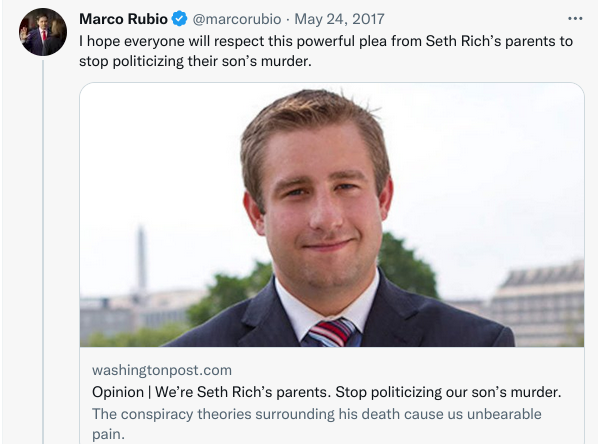
By now the Rich family was being represented by a "family spokesman" named Brad Bauman, who was described as "a PR consultant who had kicked around Democratic politics for years". Bauman told the media:
“So much of the conspiracy theory has been dependent on the allegation of federal investigators being involved, and the fact that the FBI has not and never had been involved with this investigation is critical to understanding just how false these conspiracy theories are."
This was simply not true. The FBI was most certainly involved. At that time, however, journalists just didn’t have the evidence to prove it.
Ed Butowsky’s court filings noted how the Rich family’s behaviour had "changed suddenly" once Brad Bauman got involved:
Under coercion from Mr. Bauman and the lawyer Defendants named in this lawsuit, Joel Rich stopped speaking with Mr. Butowsky and the Rich family started attacking Mr. Butowsky publicly (albeit not by name). Prior to the time of Mr. Bauman’s involvement, the Rich family acknowledged to friends and relatives that Seth and Aaron were involved in the DNC email leak, but then they suddenly changed their story. On information and belief, Mr. Butowksy alleges that Joel, Mary, and Aaron Rich were told that Aaron could be charged with felony computer crimes if they did not cooperate with their new handlers, i.e., Mr. Bauman and the lawyer Defendants.
Kim Dotcom agreed that the Rich family’s behaviour change was "very suspicious":
So to me it was very suspicious how they have dealt with anyone who was trying to shed some light on this and you read between the lines and you see how they they react to things. And also their relationships, the fact that this guy Baumann gets involved, who is really a PR person for the DNC, and now runs the whole communications strategy and defends and basically stifles any kind of conversation about this topic. The fact that the family allowed that guy to get involved when there was some, you know, at the very least, if I was the parent of Seth Rich, I would would be saying, well, I mean this whole robbery story just doesn’t add up.
Meanwhile Sy Hersh, the Pulitzer-winning journalist who exposed the 1968 My Lai massacre in Vietnam, was also investigating the Seth Rich murder and broader claims of Russian interference in the 2016 US election. Hersh had been communicating with Ed Butowsky since a mutual friend put them in touch in late January 2017. Hersh told Butowsky that he had also seen a secret FBI report that identified Seth Rich as a WikiLeaks source.
"I have someone on the inside who will go and read a file for me and I know this person is unbelievably accurate and careful. He’s a very high-level guy, he’ll do a favor."
Hersh said the FBI report showed that Seth Rich was seeking money for the emails, which he had stored in an online Dropbox, and that he had shared the Dropbox location with others "so if anything happens to me it’s not going to solve your problem”.
Unfortunately, Butowsky was secretly recording his conversations with Hersh. In August 2017 an audio file of this conversation was published online. This forced Hersh to abandon the story because his sources were now in danger.
In late 2018 the NSA sent a FOI response to Butowsky’s lawyer Ty Clevenger, saying they had identified 15 documents (32 pages) that matched his request for information about Seth Rich, but they were all marked SECRET or TOP SECRET - which meant than none would be released. It seemed strange that documents about a supposedly routine DC murder investigation would be marked TOP SECRET - perhaps they were part of the WikiLeaks/Assange investigations and only peripherally mentioned Seth Rich? Who knew.
By now Butowsky was frustrated. He said he felt he was just an unlucky chump who had tried to help out the Rich family and ended up in a convoluted mess. He said he had spent over $800,000 on lawsuits. But he also had some suspiciously close connections to the Trump White House team. In 2020, when Trump lost power, Butowsky began dropping his lawsuits and publicly retracting his claims about the Seth Rich case.
A lawyer for Butowsky told Rolling Stone that Butowsky had “decided to re-prioritize his life” and “does not wish to discuss the litigation any further.” The lawyer, Ty Clevenger, said Butowsky’s views about Seth Rich and the 2016 election had not changed. And Clevenger himself went on to dispute Rolling Stone‘s reporting on the case, claiming “the FBI has been hiding evidence from Seth Rich’s laptop, just like the FBI was hiding evidence from Hunter Biden’s laptop. I wouldn’t be surprised if the evidence was kept in the same room.”
Ty Clevenger continued lodging Freedom of Information (FOI) requests with the FBI on behalf of another Texan businessman, Brian Huddleston. The FBI continued denying that they had any information about Seth Rich. But then a series of emails between FBI agents Peter Strzok and Lisa Page - titled "Seth Rich" and dated just a month after his murder - turned up in response to another FBI FOI request from Judicial Watch. This proved that the FBI had taken an interest in the murder, and had been withholding information from Clevenger.
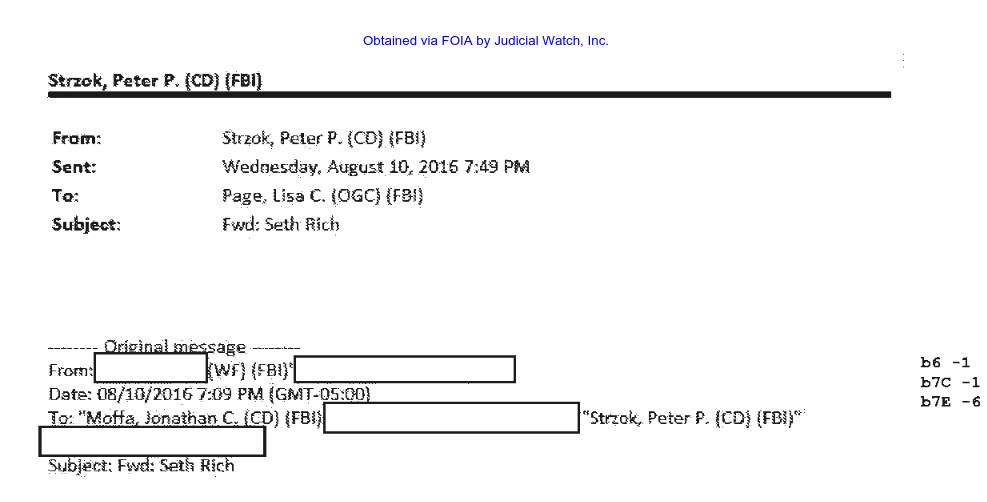
Finally, in April 2021, nearly five years since Seth Rich’s death, the FBI produced 68 pages of documents from the DNC staffer’s laptop.
A judge ordered the FBI to release even more FOI data on Seth Rich, but in October 2022 the FBI asked a court to overturn this decision. They claimed they would need a whopping sixty six years to produce such data!
- NOTE
-
At the time of writing (early 2023), the FBI is still using semantic games to delay releasing further information. The FBI has "images" (exact copies) of the contents of both Seth Rich’s personal laptop and his work computer. They are arguing that they do not need to release the requested information because they do not have the actual machines in their possession. Ty Clevenger says the distinction between physical evidence and "digital evidence" is being used as an excuse to keep information off the FBI index systems:
“The FBI can say anything is digital evidence and they don’t enter it into their index systems and nobody ever knows about it, or nobody ever finds it.”
*
CIA’s Vault 7
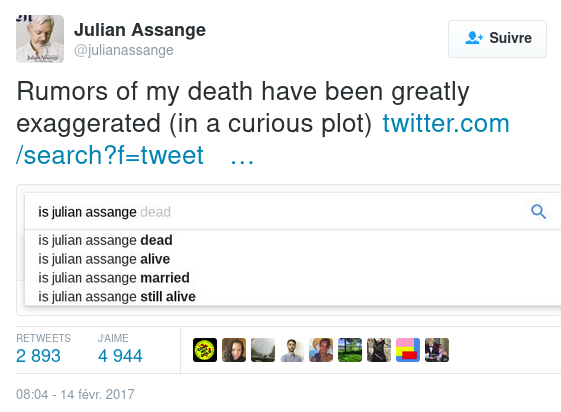
On 14 February 2017 Julian Assange began publicly using his own Twitter account, @JulianAssange (first set up in 2010 and later changed to @DefendAssange by his legal team). His first tweet ridiculed the suspiciously common rumour - prompted by Ecuador temporarily cutting off his Internet access - that he was dead.
By this time the CIA had lost control of their "crown jewels" - a highly sophisticated set of cyber weapons which they used to hack others and launch cyber attacks. US intelligence officials later said they had been investigating the leak since 2016. WikiLeaks was now preparing to publish these complex CIA tools, which they labeled "Vault 7". Assange reportedly wanted to cut a secret deal with the US government.
Assange made clear through the lawyer that he would never compromise his sources, or stop publishing information, but was willing to consider concessions like redactions.
According to articles published by The Hill in 2018, Assange’s team contacted a former Clinton Justice Department official, Adam Waldman, who visited Assange in London three times while negotiating a deal via the US Justice Department’s counterintelligence section chief David Laufman.
Laufman described what the government might want to achieve, and Waldman laid the groundwork for a deal to give Assange limited immunity and a one-time “safe passage” to leave the London embassy and talk with U.S. officials…
As the negotiations warmed, Assange unleashed his first leak on March 7, 2017, with about 8,000 pages of documents on the CIA’s cyber weapons. It did not deter the talks, however, since U.S. officials were more concerned about what he might release next.
The first batch of Vault 7 documents were titled "Year Zero". WikiLeaks posted an encrypted archive online and only revealed the password a week later, on 7 March 2017.
WikiLeaks did not name the source, but said that the files had been circulating among "former US government hackers and contractors in an unauthorized manner, one of whom has provided WikiLeaks with portions of the archive." WikiLeaks said the source "wishes to initiate a public debate about the security, creation, use, proliferation and democratic control of cyberweapons" since these tools raise questions that "urgently need to be debated in public, including whether the CIA’s hacking capabilities exceed its mandated powers and the problem of public oversight of the agency."
Meanwhile, Assaange’s secret discussions with the US government continued:
“Dear David, I relayed our conversations to Assange and he had a generally positive view of it,” Waldman wrote Laufman in mid-March.
The shuttle diplomacy soon resulted in an informal offer — known in government parlance as a “Queen for a Day” proffer — in which Assange identified what he wanted and what he might give.
Assange was prepared to negotiate redactions and also help the CIA explore why their Vault 7 files were not fully secured. He was also prepared to discuss the 2016 DNC Leaks and provide evidence to support his claim that Russia was not WikiLeaks’s source.
But then FBI Director James Comey personally stepped in and abruptly killed the deal. Comey had been notified by Democrat Senator Mark Warner, vice chairman of the Senate Intelligence Committee.
Soon, the rare opportunity to engage Assange in a dialogue over redactions, a more responsible way to release information, and how the infamous DNC hacks occurred was lost — likely forever.
*
On 13 April 2017, in his first public remarks as Trump’s new CIA director, Mike Pompeo angrily focused on WikiLeaks, labeling them "a non-state hostile intelligence service often abetted by state actors like Russia". The language suggested a new legal designation whereby Assange and WikiLeaks staff were now on a par with US enemy nations like Iran or North Korea. He called Assange a "narcissist", a "fraud" and a "coward".
“We have to recognize that we can no longer allow Assange and his colleagues the latitude to use free speech values against us. To give them the space to crush us with misappropriated secrets is a perversion of what our great Constitution stands for. It ends now."
Like Donald Trump, Mike Pompeo had publicly celebrated WikiLeaks while they were releasing Hillary Clinton’s emails.
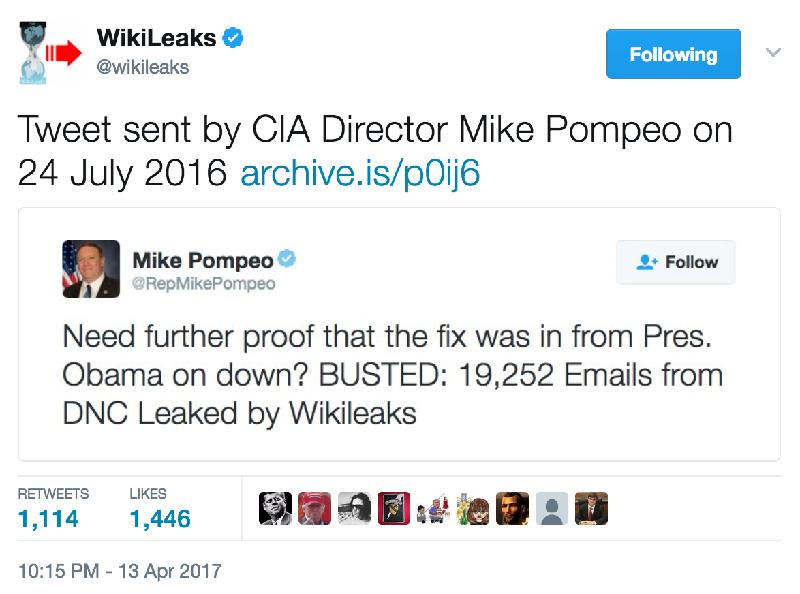
*
WikiLeaks continued releasing Vault 7 information in 24 stages, with a new CIA tool documented and explained every week or so, until early September 2017. A month later they released "Vault 8" which was the source code and development logs for "Hive", one of the CIA’s malware tools. Other source code was not released: WikiLeaks wanted people to see what the CIA had secretly been doing, but did not want to give other malicious actors the tools to copy them.
With attention-grabbing names like "AngelFire" and "Butal Kangaroo", the CIA tools had a long list of capabilities including malware, viruses, weaponised "zero day" exploits and remote control systems for phones, cars, smart TVs, web browsers and operating systems. These tools gave the CIA astonishing opportunities to perform electronic surveillance and cyber warfare. They could even to make it look like other state actors (e.g. Russia or China) were the real authors of CIA cyber attacks.
While technical experts were shocked by the sophistication of the Vault 7 tools, WikiLeaks' explanations of highly complex software were not so easy for the general public to digest. Mainstream media interest was muted.
*
In July 2022 former CIA software engineer Joshua Schulte was convicted of leaking the Vault 7 documents to WikiLeaks. His prosecution was a farce, with court testimony revealing a totally dysfunctional work environment at the CIA’s supposedly elite hacking team; immature co-workers were constantly playing pranks, shooting toy guns at each other, stealing from each others cubicles, loudly squabbling and even making death threats. It was an environment where top secret data could easily go missing. A CIA report later found multiple security failures that could have lead to the Vault 7 leak.
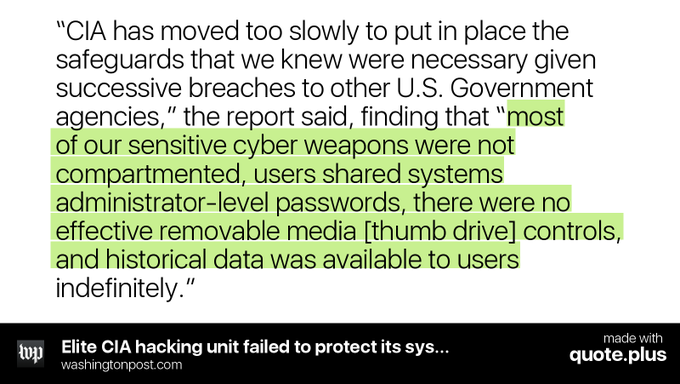
The first Schulte jury was hung, with the judge declaring a mistrial. The US government - who also prosecuted Schulte with copyright infringement and child pornography charges - demanded a retrial. Despite being held in solitary confinement for months, Schulte represented himself at his second trial, which he lost. He has always maintained his innocence.
*
CIA Assassination Plans
In the wake of the first 2017 Vault 7 publications and Pompeo’s angry rant, senior Trump administration officials began plotting to kidnap or even assassinate Julian Assange. As a team of Yahoo News journalists later revealed:
Some senior officials inside the CIA and the Trump administration even discussed killing Assange, going so far as to request “sketches” or “options” for how to assassinate him. Discussions over kidnapping or killing Assange occurred “at the highest levels” of the Trump administration, said a former senior counterintelligence official. “There seemed to be no boundaries.”
The CIA plans also included "extensive spying on WikiLeaks associates, sowing discord among the group’s members, and stealing their electronic devices". Officials wanted to legally redefine WikiLeaks and supporters like Glenn Greenwald as "information brokers" in order to remove First Amendment protections and give a green light to increased surveillance efforts. There were even discussions about poisoning Assange.
Pompeo and other top agency leaders “were completely detached from reality because they were so embarrassed about Vault 7,” said a former Trump national security official. “They were seeing blood.”
Later in 2017, when Ecuadorian officials privately discussed the possibility of officially designating Julian Assange as an Ecuadorian diplomat and transferring him to their Russian embassy, the CIA rushed out plans to block his departure:
Those included potential gun battles with Kremlin operatives on the streets of London, crashing a car into a Russian diplomatic vehicle transporting Assange and then grabbing him, and shooting out the tires of a Russian plane carrying Assange before it could take off for Moscow. (U.S. officials asked their British counterparts to do the shooting if gunfire was required, and the British agreed, according to a former senior administration official.)
Spies were placed in streets and buildings all around the Ecuadorian embassy in London. One former senior official called the level of overkill "beyond comical".
“It got to the point where every human being in a three-block radius was working for one of the intelligence services — whether they were street sweepers or police officers or security guards.”
Sources later told El Pais that the proposed move to Russia was eventually rejected by Assange on the basis that he considered it to be “a defeat” that would fuel conspiracy theories. Another source told the Greyzone that the US ambassador to Ecuador had told authorities in Quito that he knew about the plan, and warned them against executing it.
The source also told The Grayzone that when one of the Ecuadorian officials involved in conceiving the strategy to free Assange from the embassy returned to Quito, his official government vehicle was stopped on a road by masked gunmen on a motorcycle who robbed him of his laptop. The computer contained detailed information about the plan to legally allow Assange to leave the embassy.
But how did the CIA and US officials even know what Ecuadorian officials were secretly discussing with Julian Assange within the diplomatic confines of the Ecuadorian embassy?
Unfortunately, the head of security at the embassy was by now reporting to the CIA.
*
UC Global
Shortly after Julian Assange sought asylum in 2012, President Correa appointed a Spanish security firm named Undercover Global S.L. (UC Global) to manage security at Ecuador’s London embassy. A few years later, after attending a security fair in Las Vegas, David Morales, a co-founder of UC Global, told his staff that he had turned to the “dark side” and the company was now "playing in the first division”.
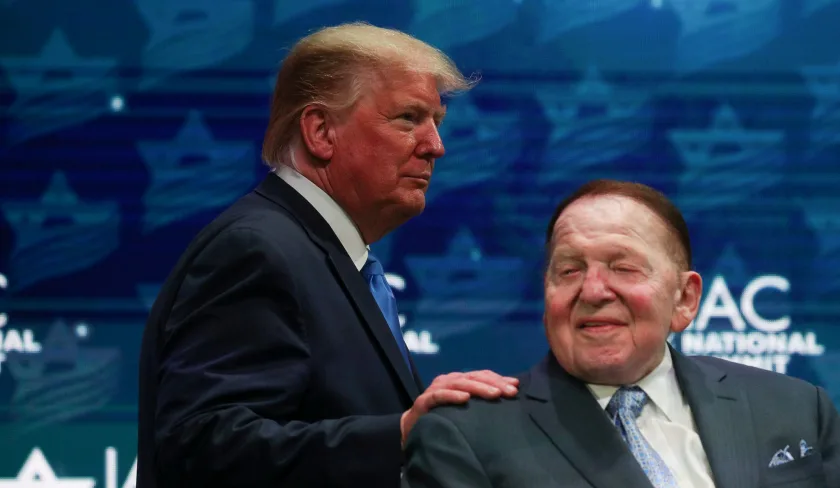
US billionaire Sheldon Adelson, owner of the Las Vegas Sands casino and a close friend of Donald Trump, gave UC Global a contract to manage security on his $70 million yacht. This contract appears to have been a covert method of channeling funds for more sinister activities (Morales was arrested in late 2019: a Spanish court is still hearing his case).
In early March 2017, when Assange was still negotiating the Vault 7 release, Morales travelled to the USA and stayed in Alexandria, Virginia, close to the CIA headquarters in Langley. According to the Greyzone, Morales was liaising with Adelson’s top bodyguard, an Israeli-American named Zohar Lahav, and Brian Nagel, a former associate director of the US Secret Service who was now the director of global security for Las Vegas Sands.
Spying inside the embassy soon caused serious problems in the outside world. Pamela Anderson discovered that her phone and email accounts were compromised after UC Global staff saw her writing them on a piece of paper inside the embassy. Italian journalist Stefania Maurizi was shocked when embassy security guards - for the first time - asked her to surrender her bag and everything inside it. She later discovered that phone calls, emails, and texts from her editors were failing to go through.
“No one could explain this disruption. I wonder if it had anything to do with these espionage activities. To this day I cannot say.”
UC Global staff even spied on a US Congressman, Dana Rohrabacher, who claimed he was visiting Assange as an official emissary of President Trump. WikiLeaks lawyers, who were present at the August 2017 meeting, said Rohrabacher offered Assange a presidential pardon in return for proof that Russia did not hack the DNC server. Rohrabacher later insisted that his visit was just a personal “fact-finding mission”.
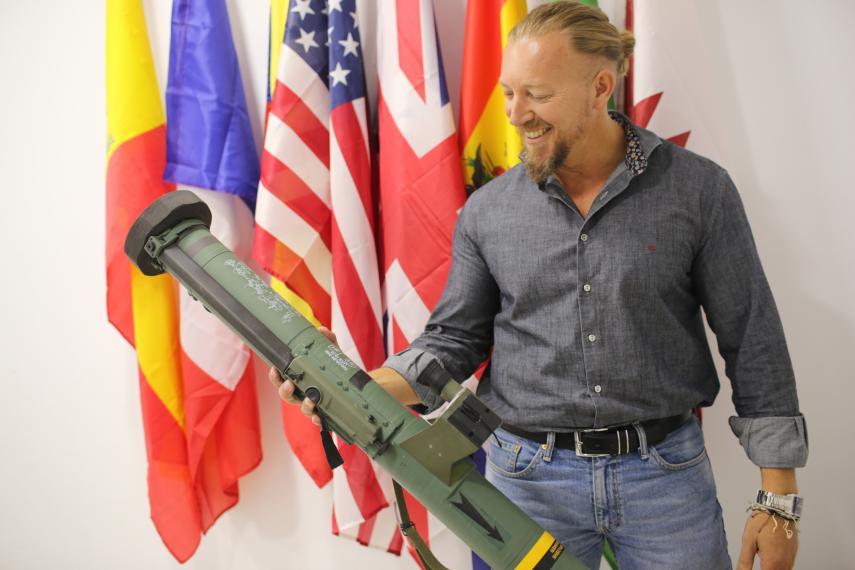
In December 2017, as El Pais reported, Morales "ordered workers to change the surveillance cameras in the embassy and replace them with others that could capture audio".
From that moment on, they recorded and monitored conversations between the WikiLeaks founder and his lawyers, as well as all of his visitors.
Under Morales’s express orders, the security team photographed the passports of all of Assange’s visitors, took apart their cellphones, downloaded content from their iPads, took notes and put together reports on each meeting…
The recordings from the cameras installed in the embassy were extracted from the hard drive every 15 days, along with other recordings from microphones placed in fire extinguishers, and delivered personally to Morales at the headquarters of UC Global, located in Jerez de la Frontera in the south of Spain. They were always original recordings, not copies.
Morales also asked his technicians to install an external streaming access point "so that all of the recordings could be accessed instantly by the United States" and also to install stickers that prevented windows from vibrating, "to make it easier for the CIA to record conversations with their laser microphones". The UC Global boss began traveling to the USA at least once a month, allegedly handing over recorded materials to people he only referred to as “the Americans.” IP addresses from some of Morales' emails show they were sent from "The Venetian", Adelson’s top hotel resort in Las Vegas.
UC Global staff became increasingly concerned about the legality of the tasks they were expected to perform. They were being asked to spy on and conceal evidence from their own clients, the same Ecuadorian officials who paid UC Global to keep their embassy secure. At one stage security staff were even asked to fetch a baby’s daiper from the rubbish because "the Americans" wanted to analyze the DNA and see if Assange was the father. At this stage a UC Global employee secretly warned Stella Moris (later Stella Assange) not to bring Julian’s baby to the embassy anymore.
“They wanted to prove that it was his child in a bid to harm him. There were talks with three Madrid labs to see how the parental connection could be proved. One of them said that DNA cannot be extracted from feces. There was an attempt to take the baby’s pacifier [dummy].”
On 20 December 2017 Rommy Vallejo, then head of Ecuador’s secret intelligence agency SENAIN, visited Julian Assange to discuss plans to whisk the WikiLeaks founder out of the embassy on Christmas Day. UC Global was technically contracted to SENAIN, whose budget paid their wages. But even so, the UC Global team opened Vallejo’s phones, took his mobile codes, and immediately alerted their "American friends".
On December 21, the day after Assange’s meeting with the SENAIN chief, US prosecutors secretly filed charges against Assange in federal court in Alexandria, Virginia.
US officials wanted to have their charges ready so that Assange could be jailed by British police as soon as he stepped outside the embassy.
*
Treachery In Ecuador
Bowing to years of concerted opposition that saw his polls steadily dropping, Rafael Correa had decided not to run for President in 2017. His ruling Alianza Pais party narrowly won a run-off election on 2 April, but it was Correa’s former Vice President, Lenin Moreno, who now became President of Ecuador.
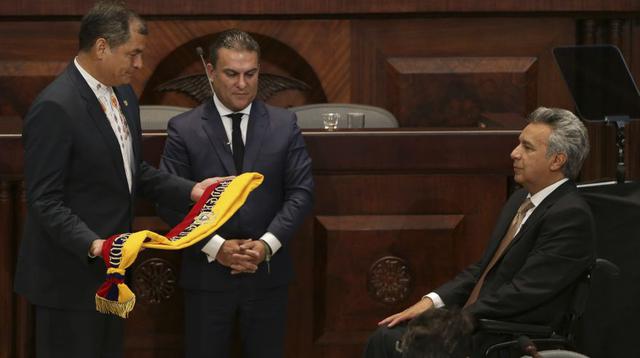
Moreno’s single term in power quickly proved to be a nightmare for the people of Ecuador and for Julian Assange in particular.
Lenin Boltaire Moreno Garcés, who was confined to a wheelchair after a shooting incident in 1988, had previously focused on advocacy for people with disabilities and had even been nominated for a Nobel Prize. He had written popular books about the importance of humour in overcoming life’s hardships. But within months of becoming President, he jailed his own Vice President and began overturning his own party’s major policies. Former government ministers including ex-President Correa were soon forced to either seek exile abroad or go to jail.
Moreno replaced judges at will. Street crime escalated and prisoners rioted as Ecuador’s economy steadily declined. In October 2019, when Moreno tried to abolish government fuel subsidies and impose harsh austerity measures, it triggered a wave of massive protests that left eight people dead and over 1,300 injured. The government was forced to temporarily relocate from the capital Quito to Guayaquil.
By the time the Covid19 pandemic hit in early 2020, Ecuador was already an economic disaster. Families dumped infected corpses in the streets until the government began distributing cardboard coffins. By the end of the year, the country of just 14 million had recorded over 200,000 cases and 14,000 deaths. Vaccinations were slow to arrive and government estimates of Covid19 fatalities were reportedly only 13% of the harsh reality. Moreno’s popularity dropped to a record low 5%, with less than 3% of citizens believing anything he said.
Meanwhile, relations with the United States flourished. In June 2018, US Vice President Mike Pence travelled to Quito for a meeting with President Moreno, who agreed to purchase US weapons, helicopters, and other equipment, and to increase military co-operation on training and intelligence sharing. A White House statement said that Pence "raised the issue of Mr Assange with President Moreno. It was a constructive conversation. They agreed to remain in close coordination on the potential next steps going forward.”
Moreno also withdrew Ecuador from the ALBA trading bloc of socialist Latin American nations (even though it was head-quartered in Quito), withdrew his diplomats from Caracas and formally recognised the US puppet Juan Guido as President of Venezuela. He even allowed US military planes to use Ecuador’s military airstrip on the Galápagos Islands, triggering further protests.
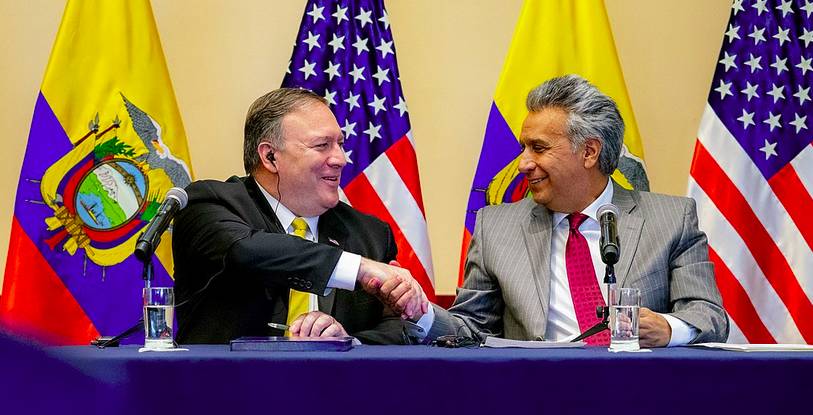
*
More Guardian Lies
One of President Moreno’s first overseas visitors in May 2017 was Paul Manafort, the former campaign chief of President Donald Trump. According to the New York Times, Manafort unsuccessfully attempted to negotiate an agreement for Ecuador to hand over Assange. Months later, Manafort was indicted on multiple charges resulting from his consulting work for Ukraine’s former pro-Russian President Viktor Yanukovych (overthrown with US support in 2014). He spent over a year in prison before President Trump pardoned him in late 2020.
In November 2018 the Guardian newspaper falsely reported that Julian Assange had met Paul Manafort inside the embassy at least three times - "in 2013, 2015 and in spring 2016" - and even suggested that Manafort might have been a source for the 2016 DNC Leaks. Although Manafort’s name was never entered into the embassy visitor logs, the Guardian’s sources seemed to have extremely vivid memories:
Manafort’s 2016 visit to Assange lasted about 40 minutes, one source said, adding that the American was casually dressed when he exited the embassy, wearing sandy-coloured chinos, a cardigan and a light-coloured shirt…
The previously unreported Manafort-Assange connection is likely to be of interest to Mueller, who has been investigating possible contacts between WikiLeaks and associates of Trump including the political lobbyist Roger Stone and Donald Trump Jr.
This article by Luke Harding and Dan Collyns was absolute, total rubbish. Paul Manafort never once visited the embassy. WikiLeaks immediately offered to bet the Guardian a million dollars - and Julian Assange’s head! - if they could prove otherwise. Years later, the story still remains online, unretracted, with no apology from Guardian editors.
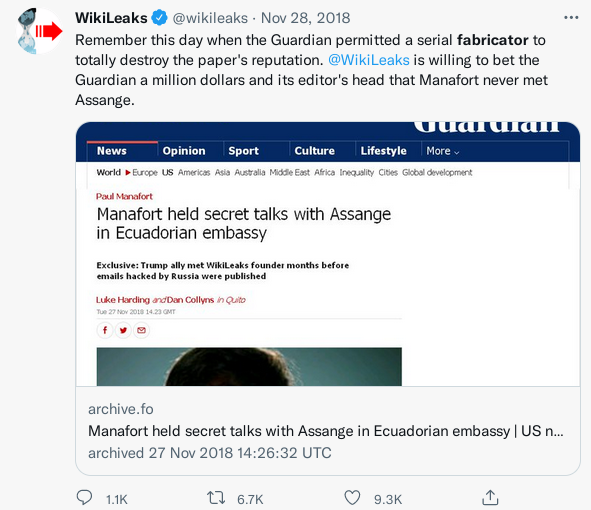
The same Guardian propaganda team, collaborating with anti-Correa journalists in Ecuador, had previously published an embarrassingly ridiculous series of articles about Assange’s life in the embassy. The May 2018 "Operation Hotel" articles - again based on leaks and gossip from UC Global staff and Moreno government officials - criticized Rafael Correa’s government for spending over $5 million to protect Julian Assange while the Australian was allegedly being visited by "hackers" and "Russian-affiliated" guests.
Correa’s government had asked UC Global to install spy equipment to protect its embassy and staff as well as Assange. But the Guardian articles insinuated that the invasive surveillance had some other sinister motive. Of course there was no mention of the even more sophisticated and intrusive equipment that was installed to help UC Global’s "American friends".
The Guardian claimed that Julian Assange had compromised the embassy’s network security:
In 2014, the company hired to film Assange’s visitors was warning the Ecuadorian government that he was “intercepting and gathering information from the embassy and the people who worked there”.
In fact it was the UC Global staff themselves who were “intercepting and gathering information from the embassy and the people who worked there” - and sending their information to the CIA! WikiLeaks called the Guardian assertions “an anonymous libel aligned with the current UK-US government onslaught against Mr Assange”.
The Hotel Ecuador stories also repeatedly tried to frame Assange as a Russian agent:
It is these visitor logs that will interest Mueller. He is reportedly close to indicting Russian hackers allegedly behind the raid on the Democrats’ electronic servers and seems to view WikiLeaks as an integral part of the Kremlin’s multifaceted espionage operation. The FBI has interviewed at least one source close to Operation Guest, it is understood.
In fact Robert Mueller’s Russiagate investigation was never able to prove any connection between Russia and WikiLeaks. His report stated that "with respect to WikiLeaks and Assange, this Office determined the admissible evidence to be insufficient on both the agreement and knowledge prongs." He never even tried to interview anyone from WikiLeaks.
*
Assange Under Pressure
By March 2018, Julian Assange’s personal Twitter account was discussing a wide range of political issues. He hotly contested the UK government’s official version of the Salisbury novichok poisonings, and staunchly supported the protest rights of pro-independence activists in Catalonia. He was also digging into the identities of mysterious Russiagate figures like Joseph Mifsud. But after posting a tweet criticising the Spanish government’s violent response to the Catalan protests, Assange once again found his Internet access cut off by Ecuador.
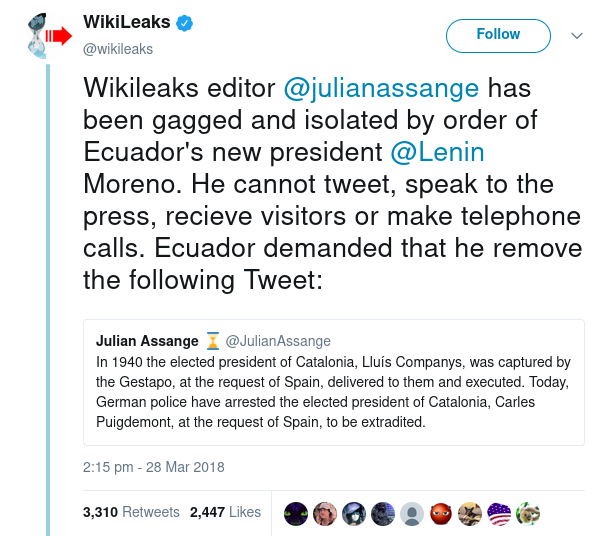
Moreno’s officials also banned visitors and phone calls, effectively shutting off access to the outside world. President Moreno said Assange was "in breach of the terms of his asylum", even though such "terms" had never existed (and do not exist under international asylum laws). Assange responded by suing Ecuador for "violating his fundamental rights."
WikiLeaks repeatedly denied that Assange had ever signed a "gag order" or made any agreement to refrain from political commentary as a condition of his refuge in the embassy.
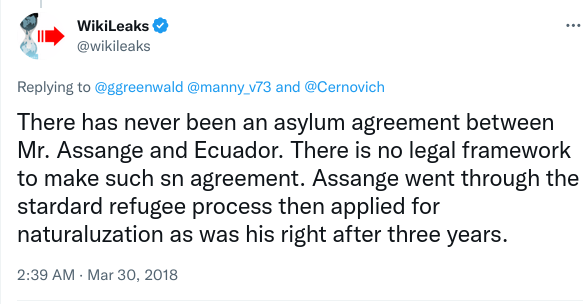
For a few months Assange’s asylum remained secure, largely thanks to the personal support of Ecuador’s Minister of Foreign Affairs, Maria Fernanda Espinosa. It was her idea to grant Assange Ecuadorian citizenship in 2017 (Moreno later revoked it). But after Espinosa moved jobs in June 2018 to become the president of the UN General Assembly, Assange’s life inside the embassy quickly became intolerable.
According to former Ecuadorian embassy staffer Fidel Narvaez, Moreno’s new embassy staff isolated Assange and "tried to break him down, so that he would leave the embassy of his own accord".
"When the isolation started arousing international condemnation, they tried to impose the so-called “protocol,” which was an outrageous prison regime of putting banana peels all over the floor to provoke him and get an excuse to kick him out. That was one of the strategies. Another was to defame him in order to justify his expulsion, and to approach the British and the Americans in order to hand Julian over."
Moreno, who repeatedly called Assange “a stone in my shoe”, told journalists that the Australian’s expulsion from the embassy was being actively discussed with UK and US officials. He said he had received written assurance from Britain that Assange would not be extradited to a country where his life would be in danger.
“Let’s not forget the conditions of his asylum prevent him from speaking about politics or intervening in the politics of other countries. That’s why we cut his communication.”
Assange’s communications were partially restored in October 2018, but harsh new rules were imposed: Assange was only allowed to use the embassy wifi for his personal computer and phone; visits had to be approved three days in advance; and he was barred from activities which could be “considered as political or interfering with the internal affairs of other states”. They even threatened to take away his cat, which was soon given to Assange family members for safe-keeping.
Most disturbingly, a memo seen by the Guardian openly discussed the possibility of British police being invited inside the embassy:
According to the memo, the embassy “reserved the right to authorise security personnel to seize equipment” or ask the British authorities to enter the embassy and do so. Any attempt to bring such equipment into the embassy would be reported as a “security breach and reported to the competent British authorities.”
When Assange’s appeal against these restrictions was dismissed by a Spanish court, he escalated his case to the US-dominated Inter-American Commission on Human Rights. They also found against him (in March 2019).
*
End Game
In February 2019, hundreds of private emails, photos and text messages from Lenin Moreno and his wife were leaked to a site called INApapers.org. Ecuadorian citizens struggling under government austerity measures were shocked to see pictures of their President’s lavish family holidays in Europe, particularly one photo of Moreno lying in bed while apparently eating lobster for breakfast.
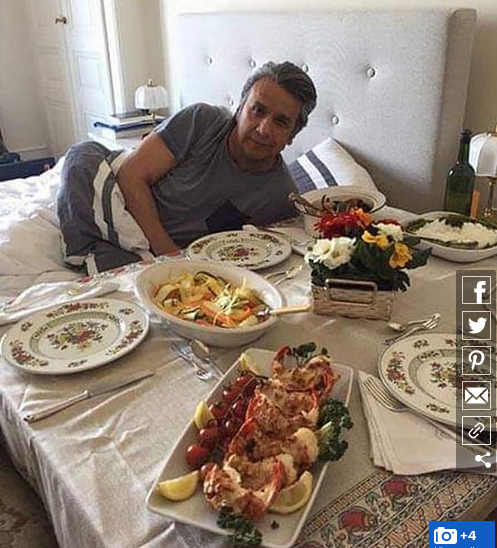
The INA Papers showed evidence that Moreno had been secretly channeling funds into off-shore Panama bank accounts via a shell company, INA Investment Corporation, which was named after his three daughters (whose names all ended in "ina"). Meanwhile the New York Times had reported that Moreno was using Assange as a bargaining chip in negotiations for a $4.2 billion loan from the International Monetary Fund (IMF).
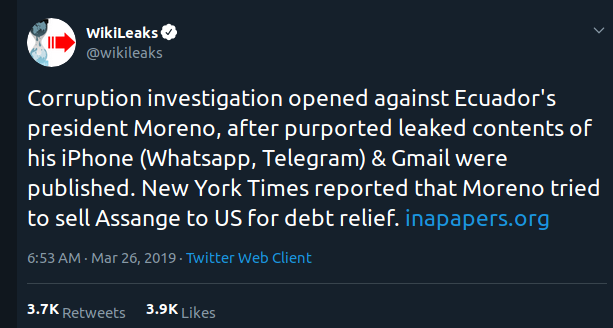
Moreno tried to divert public attention from the INA Papers scandal by blaming WikiLeaks for the leak, even though the documents were not published by WikiLeaks. Moreno said that Assange had again "violated the conditions of his asylum" and that he would "take a decision" on him "in the short term". WikiLeaks said that the Ecuadorian government was just seeking "a false pretext to end the asylum and protection of Julian Assange."
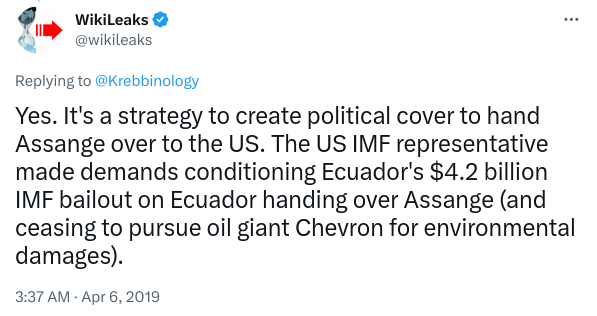
On 5 April 2019, WikiLeaks tweeted that Assange’s expulsion could happen within hours.
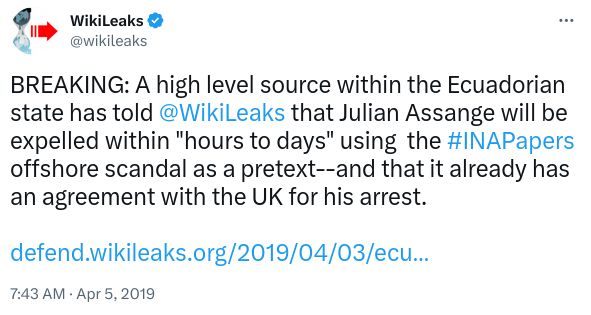
Supporters raced to the embassy and began keeping a 24/7 vigil. Russian media group Ruptly set up a live video stream which was carefully monitored by supporters all round the world.
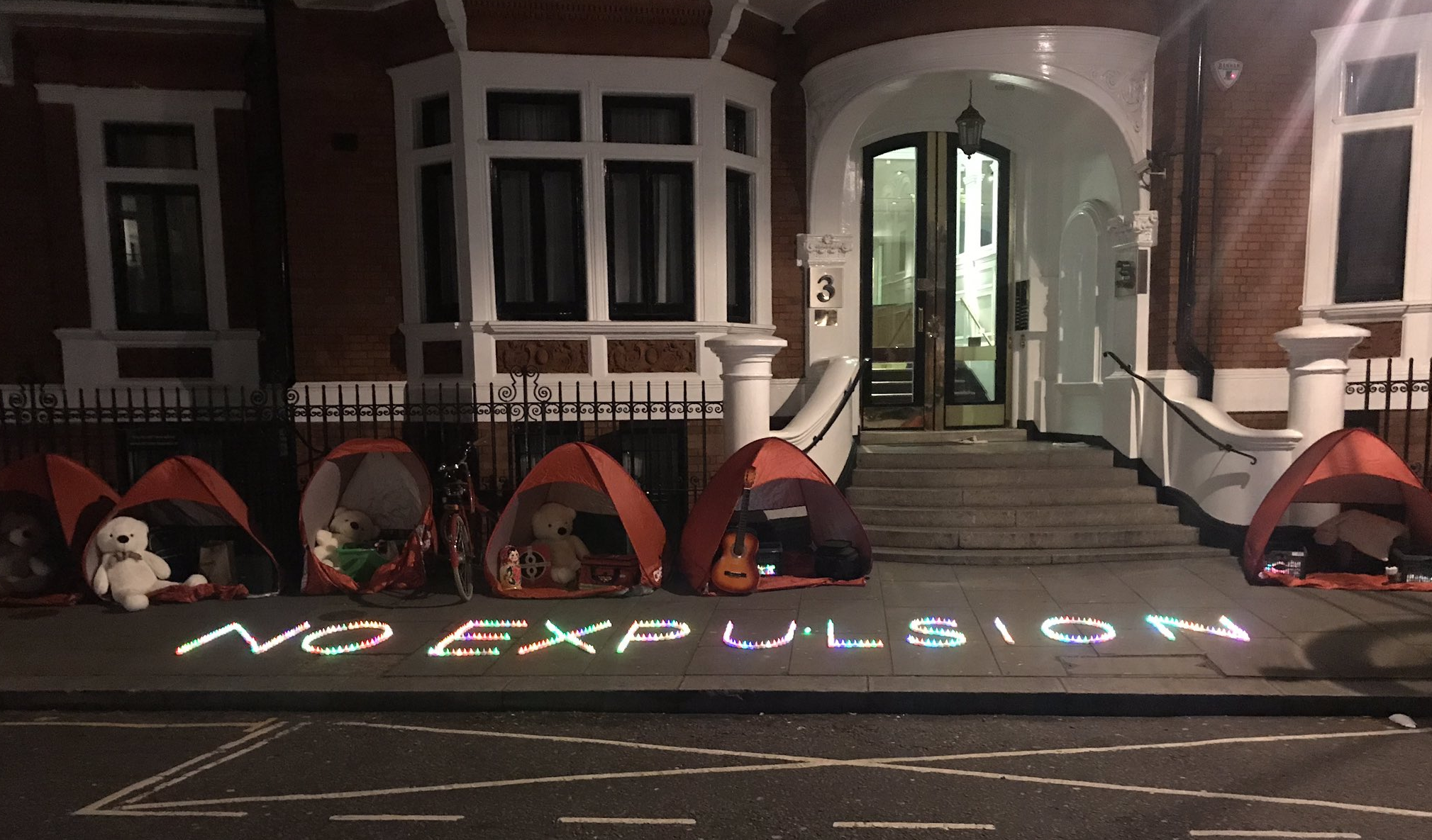
On 6 April Julian Assange received a visit from Vaughan Smith, who said his friend was in good health but had visibly lost weight and the atmosphere inside the embassy was "oppressive".
"Inside there are two cameras virtually in every room. You’re talking about a very monitored life with no real escape for you. It’s a tough place to be, but he’s a tough guy.”
*
On 10 April Kristinn Hrafnsson revealed that WikiLeaks and Assange had been the targets of a €3 million blackmail attempt. The extortionists appeared to have some 90 thousand compromised documents including legal, medical, and personal information about Assange, along with images and video from inside the embassy. The case was being investigated by Spanish authorities, as three Spanish nationals were involved.
WikiLeaks lawyers believed the case to be a conspiracy involving Ecuadorian officials and Promsecurity, an Ecuadorean company which Lenin Moreno had put in charge of embassy surveillance in May 2018 (replacing UC Global). This attempted blackmail lead circuitously to the arrest of UC Global boss David Morales, with two separate Spanish court cases digging for the truth. Assange had long complained that he was being spied on in the embassy but even at this late stage he had no idea how sophisticated, intrusive and all-encompassing the surveillance had been.
Hrafnsson said Assange had been "living in a Truman Show situation" ever since Lenín Moreno came to power and the WikiLeaks founder would probably already be in jail if supporters had not rushed to help.
*
Expulsion
Early on 11 April 2019, WikiLeaks warned that President Moreno was due to receive a report on Assange’s conformity with the embassy’s self-created "protocol", which was being used as an excuse to evict the WikiLeaks Editor-In-Chief.
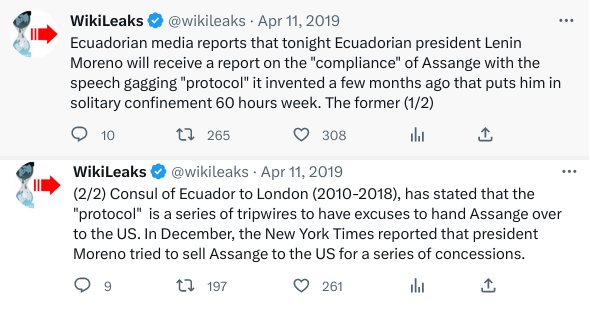
WikiLeaks also tweeted that the UN Special Rapporteur on Torture and the UN Special Rapporteur on Privacy were expected to visit the embassy in two weeks’s time. These high profile visits may have been hastily arranged in a desperate attempt to forestall the inevitable. Moreno’s victory lap was already booked into his schedule.
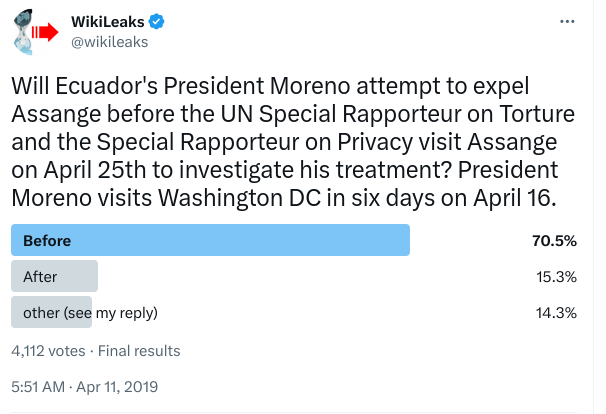
By now there were cops with machine guns outside the embassy. Supporters had exposed undercover officers parked in the side streets overnight, or peering out from nearby windows, just waiting for the signal to pounce. A meticulously choreographed multi-faceted drama was all set to play out.
First the Ecuadorian government formally terminated Assange’s asylum, based on his supposed failure to respect their ridiculous "protocol". Then Ecuador’s Ambassador to the UK invited the Metropolitan Police into the embassy. Julian Assange shouted "This is unlawful, I am not leaving." He was forcibly dragged out by five officers who bundled him into a waiting van. He was carrying a copy of Gore Vidal’s "History of the National Security State" and shouted to the nearby crowd of gathered police, journalists and supporters: "the UK has no sovereignty" and "the UK must resist this attempt by the Trump administration…"
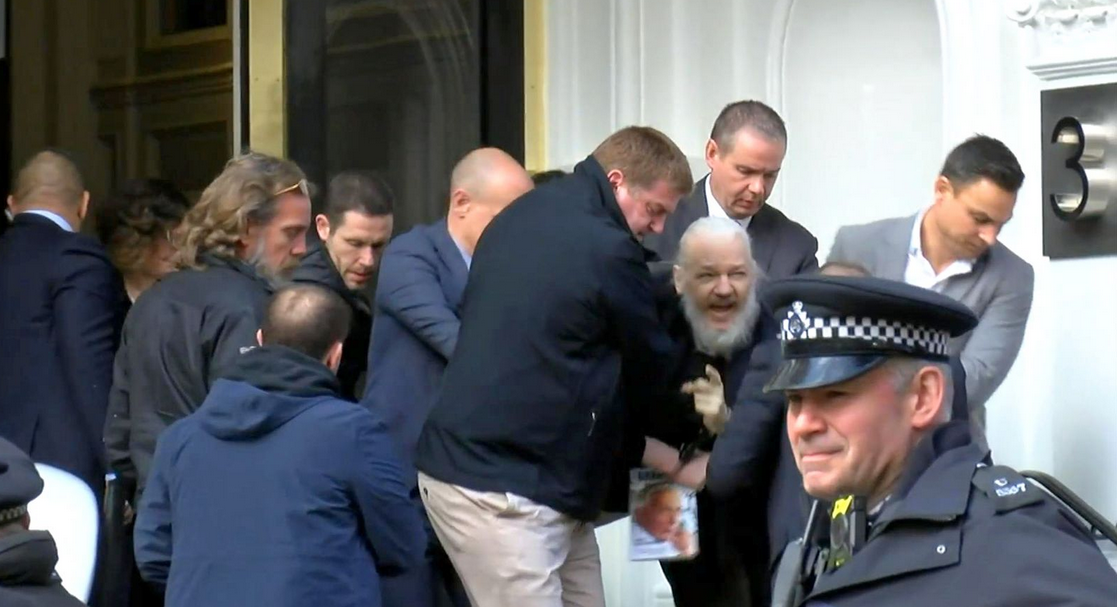
Assange was taken to a central London police station before a hearing at Westminster Magistrates' Court a few hours later. District Judge Michael Snow said Assange’s behaviour was "that of a narcissist who cannot get beyond his own selfish interest". Assange was declared guilty of breaching the terms of his bail and later sentenced to the maximum 50 weeks in prison.
Meanwhile the US government charged Assange with conspiring to “knowingly access a computer without authorisation” in order to obtain secret information whose release “could be used to the injury of the United States and the advantage of any foreign nation”. The charge carried a maximum jail sentence of 5 years but was soon followed by 16 other charges carrying a maximum 175 years in jail.
Sir Alan Duncan, the UK Minister of State for Europe and the Americas, watched a live-feed of Assange’s arrest from the Operations Room at the top of the Foreign Office building. After Assange had been transferred to London’s maximum security Belmarsh Prison, and jailed alongside hardened murderers and convicted terrorists, Duncan held a drinks party in his office for the "Operation Pelican" team that had overseen his expulsion from the embassy.
“I gave them each a signed photo which we took in the Ops Room on the day, with a caption saying ‘Julian Assange’s Special Brexit Team 11th April 2019’”, he later wrote in his memoirs.
Assange’s lawyer Jennifer Robinson visited Assange in the police cells, where he sent a message of thanks to supporters and said:
"I told you so."
*
Reaction
This was the first time in history a government had ever allowed foreign police to enter its sovereign territory to arrest one of its citizens. British media greeted news of the arrest with delight.
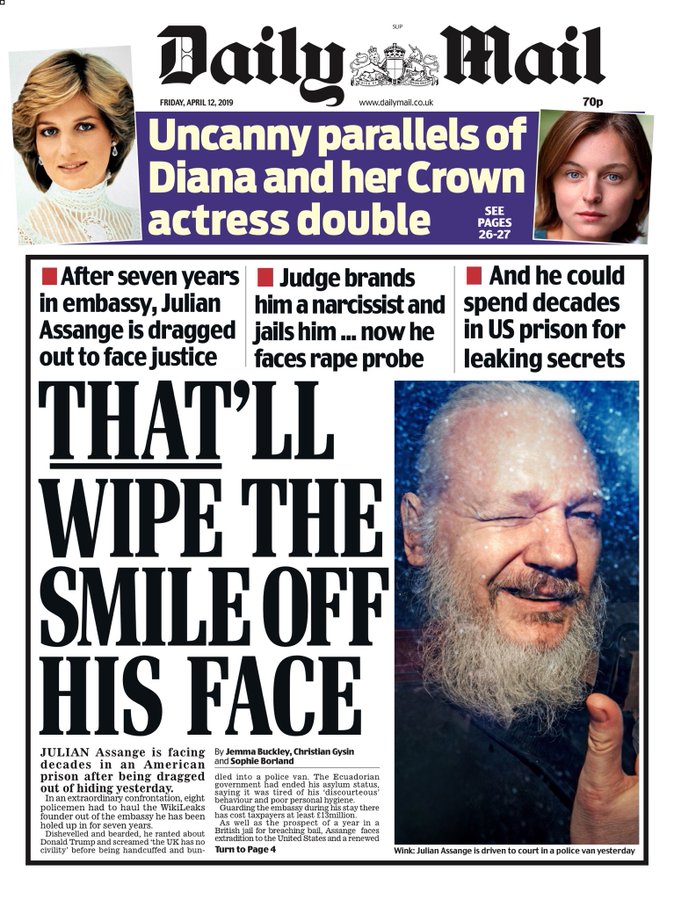
Ecuador’s President Lenin Moreno told reporters that Assange was a "spoiled brat" who did not have the right to "hack private phones". Ecuador also jailed a Swedish computer programmer, Ola Bini, who lived in Quito and was a friend of Julian Assange’s, accusing him too of hacking.
The Executive Board of the IMF rapidly approved a loan package of $4.2 billion to the government of Lenin Moreno for what it called a “more dynamic, sustainable, and inclusive economy for the benefit of all Ecuadorians.”
The agreement coincided with layoffs of over 10,000 public sector workers, in addition to the ongoing policy of slashing in public and social spending, a decrease in the level of minimum wage and the removal of secure work protections that marked the sharp neoliberal turn of the Ecuadorian government under Moreno.
Rafael Correa accused his successor of “a crime humanity will never forget”. He described Moreno as “the greatest traitor in Ecuadorian and Latin American history”.
When asked about the arrest, US President Donald Trump, who had reportedly mentioned WikiLeaks 164 times in the final month of the 2016 election, said:
"I know nothing about WikiLeaks. It’s not my thing."
British Prime Minister Theresa May thanked Ecuador’s President Moreno and told the House of Commons: "This goes to show that in the UK, no one is above the law."
Australian Prime Minister Scott Morrison said Assange was "not going to be given any special treatment". Foreign Minister Marise Payne said he would continue to receive "the usual consular support".
Swedish lawyer Elisabeth Massi Fritz submitted a request to the Swedish prosecutor’s office to resume the preliminary investigation.
"We are going to do everything we possibly can to get the Swedish police investigation reopened so that Assange can be extradited to Sweden and prosecuted for rape… No rape victim should have to wait nine years to see justice be served."
The investigation went nowhere and was finally dropped for the last time in November 2019.
*
THE NEXT CHAPTER IS ON THE WAY SOON!
The author of this book can be found on Twitter: @Jaraparilla
*
Home - Genesis - 2007 - 2008 - 2009 - Early 2010 - Mid 2010 - Late 2010 - End 2010 - Early 2011 - Mid 2011 - Late 2011 - End 2011 - Early 2012 - Late 2012 - Early 2013- Late 2013 - 2014 - 2015 - Early 2016 - Late 2016 - 2017-19
Copyright Gary Lord 2021, 2022, 2023